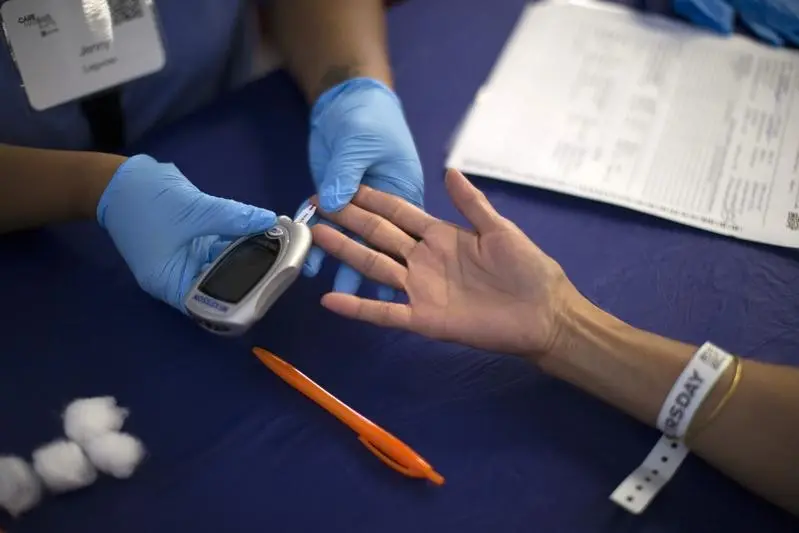PHOTO
Dubai resident Maya Smith received a letter from her teenage son's school stating he was obese and that his Body Mass Index (BMI) needed to be brought in control. He has been battling weight issues due to erratic eating habits and has symptoms of borderline diabetes. She is a working mother and her challenge is to provide healthy food consistently, starting from breakfast, lunch, snacks and dinner. This is just one of the examples of an emerging area of concern in the UAE, medical experts have opined.
In the wake of industrialisation and mechanisation, the incidence of both obesity and diabetes has zoomed. These twin problems tend to occur together triggering usage of the new term 'diabesity'. Four decades ago, Type 2 diabetes was a disease of middle-aged and old people, starting from 40 to 60 years of age.
"The main cause of Diabesity is the fast-changing lifestyle. With the increasing use of gadgets, changing food habits, diminishing physical activity, irregular lifestyles, inadequate sleep and increasing levels of mental stress, the incidence of diabesity has risen exponentially. One in every five people above the age of 20 suffer from diabesity. The incidence is significantly higher in the UAE when compared to the US. To make matters worse, the problem is now starting at a younger age, during teens. This trend of early onset of diabesity is a very bad sign for society. These children stand to have serious health problems like heart attacks in the early thirties. At the age when a person properly settles in life and starts contributing to the society, these children would be totally engrossed in saving their lives," said Dr Vipin Mishra, consultant endocrinology, Zulekha Hospital.
"According to the data published by the WHO, 41 million children under the age of five are either overweight or obese. Moreover, if you consider children and adolescents in the age group between five and 19 years, the WHO data shows over 340 million are overweight or obese. These numbers show a high rate of obesity trend among younger age groups. This is alarming because these young children and adolescents could develop not only diabetes but other problems such as hypertension, ischemic heart disease among others," added Dr Amal Yacoub Ayed Madanat, consultant endocrinologist, RAK Hospital.
"The world is witnessing an epidemic of obesity which is regarded as a chronic disease simply because it leads to many complications. Among the complications of obesity are hypertension, diabetes mellitus, ischemic heart disease, increased cancer risk, mood disorder, reproductive disorder, fatty liver disease and also joint problems. The close relationship between obesity and diabetes development has led to the introduction of the term diabesity. This is because we want to emphasise the relationship. The management of diabetes is impossible without the management of body weight," added Madanat.
The prevalence of obesity in GCC among children and adolescents ranges from five per cent to 14 per cent in males and three per cent to 18 per cent in females. In the UAE, schoolchildren/youth are said to be 1.8 times more obese when compared with the international standards.
Dr Anjana Kannoth, specialist - paediatrics and neonatology, Aster Hospital Mankhool, said: "Diabesity represents a new health epidemic and some contributing factors include eating outside the home, television and computer viewing for long hours, eating while watching television, exposure to food advertising, extra snacking, and lack of physical activity.
"Preventing childhood obesity will prevent Type 2 diabetes in children since the disease is so strongly related to weight. Pediatricians need to proactively discuss and promote healthy eating behaviours to children at an early age and empower parents to promote children's ability to self-regulate energy intake. Significant changes in growth patterns can and should be recognised and addressed before children become severely overweight."
Tips for a healthy lifestyle
>Limit your child's consumption of processed food, saturated fat, sodium, cholesterol and added sugars
>Provide plenty of fruits and vegetables
>Eat meals as a family as often as possible
>Limit eating out, especially at fast-food restaurants, and when you do eat out, teach your child how to make healthier choices
>Adjust portion sizes appropriately for their age
>Limit TV and other "screen time" to less than 2 hours a day for children older than two. (Kids who watch TV for more than 4 hours a day are more likely to be overweight compared with kids who watch 2 hours or less. And, kids who have a TV in the bedroom are more likely to be overweight.)
>Be sure your child gets enough sleep
>Encourage outdoor physical activity at school and home
>Encourage open dialogue. Go ahead and talk with your children about weight and encourage them to share their thoughts and feelings about body image whenever they arise
>Be sure your child sees the doctor for well-child checkups at least once a year
Copyright © 2019 Khaleej Times. All Rights Reserved. Provided by SyndiGate Media Inc. (Syndigate.info).





















